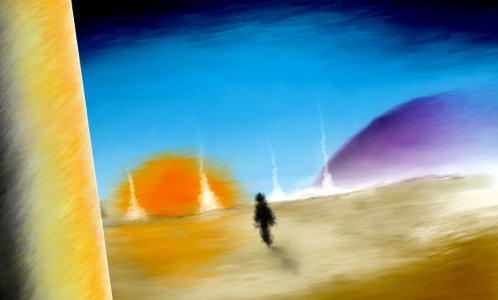
art by Shane M. Gavin
Sacred Artifacts
by Greg Leunig
You stand in line outside the Federal Mandate building, shuffling towards the religious loyalty checkpoint. It is a gray day, but then, it seems like that's the only kind of day anymore. Between the regular smog and all the smoke from Vancouver, a constant shield of clouds hangs heavy in the sky, moisture clumped onto smoke particles.
The guards, four men in white and gold uniforms, look bored. They usher everyone through the loyalty checkpoint quickly. Your heart always pounds when you wait in this line. There haven't been many executions in Spokane, but they have a lot in Seattle, and ever since your mother, it's no surprise that you can't get through one of these without some flutters.
An older man at the front of the line stumbles halfway through the checkpoint, falls to the side. He is hauled up roughly by one of the guards, stammering apologies. You think he might be shot on the spot, but he is simply yanked back to his previous position. He finishes quickly. You wonder if he is secretly Jewish, if he stumbled at the likeness of Moses because of a sudden flash of guilt. Or if he is just an old man, his balance failing him.
When you get close enough to see the plates, sacred images from every major faith but Christianity, you wonder for the thousandth time if the irony is lost on the government that this is the same technique used to root out Christians in feudal Japan.
And then it is your turn. The guards are not really looking at you, they are perhaps thinking about what bar they will go to tonight. The first plate is a likeness of Charles Darwin. Talk about irony. No atheist has ever refused to walk on Darwin's face. Indeed, you like to think that there is a Church of Darwin somewhere, and that the first commandment is to step on his face in order to preserve your genetic material.
You would laugh at the irony, but for your mother. You will never forget how she went through the first checkpoint, stepping on every plate, then getting off at the far end and taking a Bible out of her purse and placing it on the ground, and stepping on that too. That was in the beginning days of the Office of Religious Loyalty, before they knew how many dissenters they would have. She had a cursory trial, and was executed by hanging. Whenever you want to laugh you instead see her standing beside fifty others at the gallows, head high.
After Darwin is the Buddha. You step on him too. Then comes the goddess, Shiva. The destroyer. You wonder if this is planned, of all the Hindu gods and goddesses, and suppose it probably is. Next comes Moses, and you step on him. After this is an image of the prophet Mohammed. This is the last plate. You hesitate. You are certainly not a Muslim. From a very long, very white line of Carters and Jamesons, you're a staunch atheist. You don't know why you hesitate. Perhaps this is a little piece of your mother inside you. Or your father. You remember how after your mother, your father made you promise not to dissent, not to get yourself killed. How he told you he couldn't bear to lose you, too. Then you went away to college, and while you were working on your degree, he was writing an underground atheist newsletter.



